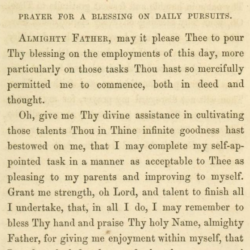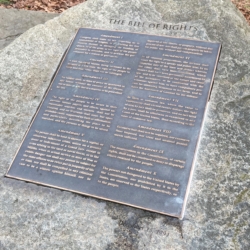During the Middle Ages, Comtat Venaissin was an independent enclave within but separate from the Kingdom of France. Life in the Comtat was considerably more attractive than under the French Crown. The enclave’s inhabitants did not pay taxes and were not subject to military service. For French Jews, the Comtat was a haven. Under papal rule, they received much better treatment than under the rule of the French monarchy. Carpentras, Avignon, Lisle, and Cavaillon, (together called the “Arba’ Ḳehillot,” the four communities) were the only Jewish communities tolerated in the French pontifical territory. The oldest synagogue in France, built in the 14th century, survived in Carpentras. Until the French revolution the Jews of the Comtat preserved a distinctive Provençal nusaḥ. In 1767, Eliyahu Karmi (Elijah Crémieux) compiled a siddur preserving this nusaḥ of the Comtat titled the סדר התמיד (Seder HaTamid). Just after the section for תפלת שחרית (the morning prayers), Karmi provides the above advice for how to organize one’s workday.
TOGGLE COLUMNS (on/off):ADJUST COLUMN POSITIONS: select the column header cell and drag it where you want. show me!COPY INDIVIDUAL COLUMN(S): use CopyTables, a browser extension.
| Source (Hebrew) | Translation (English) |
|---|---|
אחר שישלים תפלתו ילמוד מעט או ילך לבית המדרש וישמע מהתלמידים ואחר כך יפנה לעסקיו ולאמונתו כי כל תורה שאין עמה מלאכה סופה בטלה והעוני יעבירהו על דעת קונו. וישא ויתן באמונה ויהא דבורו בנחת עם הבריות ואל יעשה מריבה בשום אדם ויזהר מלישבע אפילו על האמת וכל שכן שלא ישבע לשקר ולא יזכיר שם שמים לבטלה. ולא יפנה עצמו לבטלה כי הבטלה מביא את האדם לכל הרהור עבירה אלא בכל עת יעסוק לאיזה עסק טוב ויעיין תמיד בנכסיו ובמעשיו. וכשיתנהג את עצמו באזהרות אלו מובטה לו שהקדוש ברוך הוא ישלח ברכה רוחה והצלחה בכל מעשה ידיו. |
After finishing Tephilat Schacharit, a person should learn Torah for a few moments or go to the Beit Midrash and listen to the students. Then he should attend to his affairs and proceed to his place of work because Torah learning that is not combined with work has no value. Poverty will then lead him to violate his Master’s rules. He should conduct his business in good faith. He should speak softly to other human beings. He should not start fights with anyone. He should be careful not to take an oath even concerning a matter that he knows to be true. Most certainly he should not take an oath falsely and he should not mention G!d’s name in vain. He should avoid idleness because idleness causes improper urges. Instead he should always pursue lofty goals and he should always be examining his personality and his deeds. If a person conducts himself within these parameters he will be certain that G!d with bless him with success in whatever he undertakes. |
Abe Katz’s translation of this piece of post-tefillah advice was first included in his sourcesheet, “Good advice to start the day from a Siddur published in 1766.” I have digitally transcribed the text in Unicode Hebrew, proofread his translation, and added a bit of historical context from the Jewish Encyclopedia and Wikipedia’s entries on the Comtat Venaissin. –Aharon Varady.

“After Shaḥarit: Abiding Advice for Daily Living, by Eliyahu Carmi (1767)” is shared through the Open Siddur Project with a Creative Commons Attribution-ShareAlike 4.0 International copyleft license.









